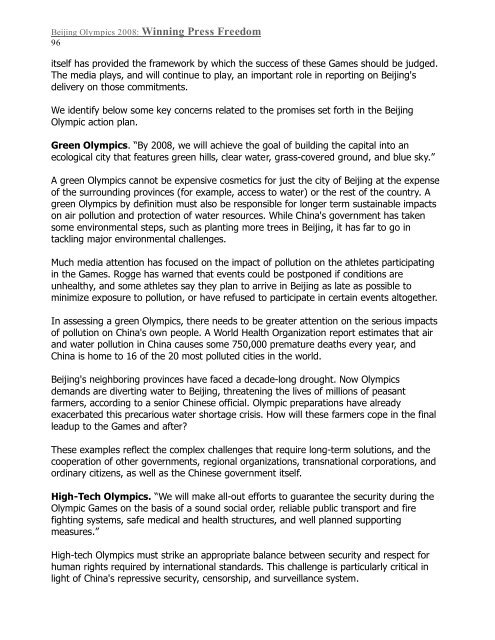Beijing Olympics 2008: Winning Press Freedom - World Press ...
Beijing Olympics 2008: Winning Press Freedom - World Press ...
Beijing Olympics 2008: Winning Press Freedom - World Press ...
You also want an ePaper? Increase the reach of your titles
YUMPU automatically turns print PDFs into web optimized ePapers that Google loves.
<strong>Beijing</strong> <strong>Olympics</strong> <strong>2008</strong>: <strong>Winning</strong> <strong>Press</strong> <strong>Freedom</strong><br />
96<br />
itself has provided the framework by which the success of these Games should be judged.<br />
The media plays, and will continue to play, an important role in reporting on <strong>Beijing</strong>'s<br />
delivery on those commitments.<br />
We identify below some key concerns related to the promises set forth in the <strong>Beijing</strong><br />
Olympic action plan.<br />
Green <strong>Olympics</strong>. “By <strong>2008</strong>, we will achieve the goal of building the capital into an<br />
ecological city that features green hills, clear water, grass-covered ground, and blue sky.”<br />
A green <strong>Olympics</strong> cannot be expensive cosmetics for just the city of <strong>Beijing</strong> at the expense<br />
of the surrounding provinces (for example, access to water) or the rest of the country. A<br />
green <strong>Olympics</strong> by definition must also be responsible for longer term sustainable impacts<br />
on air pollution and protection of water resources. While China's government has taken<br />
some environmental steps, such as planting more trees in <strong>Beijing</strong>, it has far to go in<br />
tackling major environmental challenges.<br />
Much media attention has focused on the impact of pollution on the athletes participating<br />
in the Games. Rogge has warned that events could be postponed if conditions are<br />
unhealthy, and some athletes say they plan to arrive in <strong>Beijing</strong> as late as possible to<br />
minimize exposure to pollution, or have refused to participate in certain events altogether.<br />
In assessing a green <strong>Olympics</strong>, there needs to be greater attention on the serious impacts<br />
of pollution on China's own people. A <strong>World</strong> Health Organization report estimates that air<br />
and water pollution in China causes some 750,000 premature deaths every year, and<br />
China is home to 16 of the 20 most polluted cities in the world.<br />
<strong>Beijing</strong>'s neighboring provinces have faced a decade-long drought. Now <strong>Olympics</strong><br />
demands are diverting water to <strong>Beijing</strong>, threatening the lives of millions of peasant<br />
farmers, according to a senior Chinese official. Olympic preparations have already<br />
exacerbated this precarious water shortage crisis. How will these farmers cope in the final<br />
leadup to the Games and after?<br />
These examples reflect the complex challenges that require long-term solutions, and the<br />
cooperation of other governments, regional organizations, transnational corporations, and<br />
ordinary citizens, as well as the Chinese government itself.<br />
High-Tech <strong>Olympics</strong>. “We will make all-out efforts to guarantee the security during the<br />
Olympic Games on the basis of a sound social order, reliable public transport and fire<br />
fighting systems, safe medical and health structures, and well planned supporting<br />
measures.”<br />
High-tech <strong>Olympics</strong> must strike an appropriate balance between security and respect for<br />
human rights required by international standards. This challenge is particularly critical in<br />
light of China's repressive security, censorship, and surveillance system.





